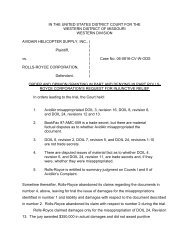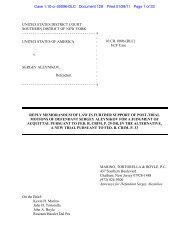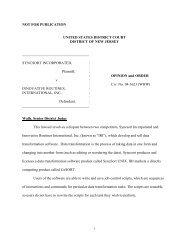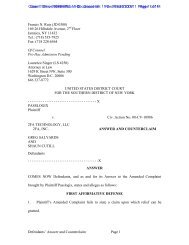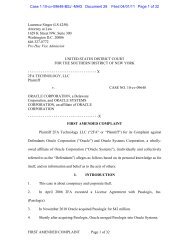in the united states district court for the district of delaware
in the united states district court for the district of delaware
in the united states district court for the district of delaware
Create successful ePaper yourself
Turn your PDF publications into a flip-book with our unique Google optimized e-Paper software.
through corporate ownership is <strong>in</strong>sufficient to establish rights as a third-party beneficiary"')<br />
(<strong>in</strong>ternal citations omitted). Moreover, <strong>in</strong> its brief<strong>in</strong>g on <strong>the</strong> motion <strong>for</strong> jurisdictional discovery,<br />
Pla<strong>in</strong>tiff never articulates <strong>in</strong> any detail why IRP's attenuated connection to this plant demonstrates<br />
evidence <strong>of</strong> <strong>the</strong> requisite <strong>in</strong>tent. (See D.I. 28 at 10; D.I. 42 at 6-7)<br />
Instead, <strong>in</strong> its briefs, Pla<strong>in</strong>tiff relies primarily on Hadley <strong>in</strong> support <strong>of</strong> its third-party<br />
beneficiary argument. (D.I. 28 at 5) In Hadley, <strong>the</strong> contract at issue was a Merger Agreement<br />
between StatesRail L.L.C. and K.iamichi Railroad Company ("K.iamichi"). 2003 WL 21960406<br />
at * 1. Be<strong>for</strong>e <strong>the</strong> merger, K.iamichi was a closely held corporation with approximately 16<br />
shareholders, <strong>in</strong>clud<strong>in</strong>g third-party defendants Jack Hadley (who, along with his wife, were <strong>the</strong><br />
majority shareholders <strong>of</strong> Kiamichi, own<strong>in</strong>g 60% <strong>of</strong> <strong>the</strong> shares) and Thomas Hadley (collectively,<br />
"<strong>the</strong> Hadleys"). Id. at *1, *5. The Hadleys argued that, as non-signatories to <strong>the</strong> Merger<br />
Agreement, <strong>the</strong>y were not bound by its <strong>for</strong>um selection clause. I d. at *2. However, <strong>the</strong> small<br />
group <strong>of</strong>K.iamichi shareholders (<strong>in</strong>clud<strong>in</strong>g <strong>the</strong> Hadleys) were not only repeatedly referenced <strong>in</strong><br />
<strong>the</strong> Merger Agreement, but were also to receive payments <strong>of</strong> up to $1.4 million under <strong>the</strong> terms<br />
<strong>of</strong> <strong>the</strong> agreement if <strong>the</strong> merger was completed. I d. at * 1. Moreover, <strong>the</strong> Merger Agreement itself<br />
had to be approved by <strong>the</strong> K.iamichi shareholders be<strong>for</strong>e it could become f<strong>in</strong>al, and thus <strong>the</strong><br />
Hadleys had <strong>in</strong>dividually consented to <strong>the</strong> stock purchase and merger that was at <strong>the</strong> heart <strong>of</strong> that<br />
agreement. Id. at *5. These factors led this Court to conclude that "[t]he Hadleys, as [majority]<br />
shareholders, were undoubtedly <strong>in</strong>tended to receive a benefit from <strong>the</strong> sale <strong>of</strong> <strong>the</strong>ir stock through<br />
<strong>the</strong> Merger Agreement" and that <strong>the</strong>y were third-party beneficiaries <strong>of</strong> <strong>the</strong> agreement. I d.<br />
As discussed above, <strong>the</strong> TLA has no analogous provisions. IRP is never specifically<br />
named <strong>in</strong> <strong>the</strong> TLA; <strong>the</strong> TLA only refers to IRP <strong>in</strong>directly as one <strong>of</strong> a group <strong>of</strong>"Affiliates" <strong>of</strong><strong>the</strong><br />
16



